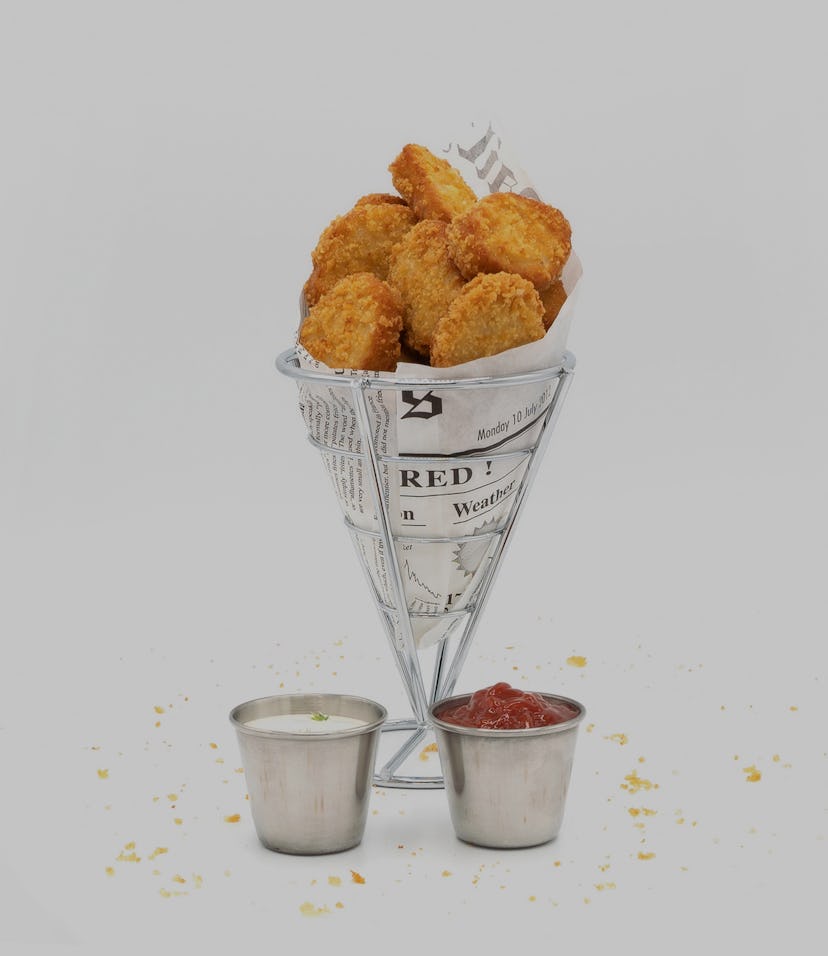Culture
Impossible Foods' chicken nuggets could be its ticket to world domination
The company's not-chicken nuggets will be hitting restaurants as soon as this fall.

Vegetarian and vegan friends, it’s time to stock up on ketchup and any other dipping sauces you might crave, for the Impossible Nugget is well on its way. Impossible Foods told Bloomberg that its imitation chicken nuggets are expected to launch in the United States as soon as this fall. They’ll come to restaurants first and retailers later.
The nuggets are expected to be shown off to customers for the first time at an unnamed trade show this coming week, Impossible said. The company hopes to replicate the runaway success of its faux-beef products, which have really taken off since their first restaurant debut at David Change’s Momofuku restaurant in 2016. Now every Burger King across the U.S. (and some other locations) includes the Impossible Whopper amongst its traditional products; Disney has opted into the company’s faux-meat hype; and it’s pretty easy to come by the fake beef at your average grocery store or even Walmart.
Interest in faux meat products has skyrocketed since the beginning of the COVID-19 pandemic, thanks in no small part to rising beef prices and general meat scarcity around the world. Now the more difficult mission begins: utilizing that momentum to push the company’s success beyond the room made for it during the pandemic.
No heme, no problem — Impossible’s beef products have seen huge market success — the company is now valued at $10 billion and is planning to go public in the near future — but that success hasn’t been without its setbacks. The biggest of those is due to a feature of the alt-beef itself: heme. Heme is a protein molecule that gives beef its red color and generally, well, meaty texture.
Plants also produce heme, and Impossible’s food scientists successfully created a process whereby large quantities of the protein could be created from soy plants. The FDA unilaterally accepts that this plant-based heme is safe to eat — but the European Union has yet to give its approval on the matter. Heme is considered a GMO, which are generally banned in the E.U. without special approval; Impossible Foods has yet to receive this go-ahead. The same is true of China, which has a whopping 27 percent of the global meat market.
Impossible’s chicken nuggets don’t use heme, though, and doesn’t include any GMOs at all. This should allow Impossible to sell its nuggets in these as-of-yet untouched markets, creating a presence in both the E.U. and China while it waits for approval on its alt-beef products.
Everyone’s in on the game, now — There’s another major factor that could limit Impossible’s success in the alt-chicken market, namely that other companies have been making fake chicken nuggets for years now. As non-meat-eaters will tell you, chicken is actually one of the easiest products to replace in your diet for this very reason. Gardein and Lightlife have been producing faux chicken strips for years, and newer offerings like Simulate’s Nuggs have gained significant market traction, too.
But then again, these companies have also offered simulated beef products for years — Impossible and its closest rival Beyond Meat were both still able to swoop in and dominate that market.
Beyond Meat has edged just slightly ahead of Impossible in most endeavors thus far; the company is already publicly traded with a market cap of about $8 billion. If Impossible manages to pull out that rumored $10 billion IPO at some point, though, it might just be unstoppable.